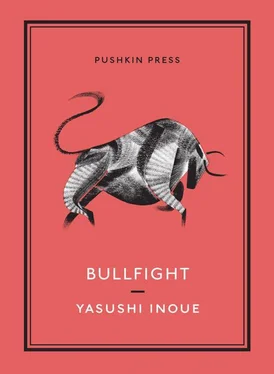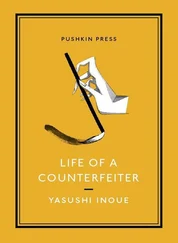Yasushi Inoue - Bullfight
Здесь есть возможность читать онлайн «Yasushi Inoue - Bullfight» весь текст электронной книги совершенно бесплатно (целиком полную версию без сокращений). В некоторых случаях можно слушать аудио, скачать через торрент в формате fb2 и присутствует краткое содержание. Год выпуска: 2013, Издательство: Pushkin Collection, Жанр: Классическая проза, на английском языке. Описание произведения, (предисловие) а так же отзывы посетителей доступны на портале библиотеки ЛибКат.
- Название:Bullfight
- Автор:
- Издательство:Pushkin Collection
- Жанр:
- Год:2013
- ISBN:нет данных
- Рейтинг книги:4 / 5. Голосов: 1
-
Избранное:Добавить в избранное
- Отзывы:
-
Ваша оценка:
- 80
- 1
- 2
- 3
- 4
- 5
Bullfight: краткое содержание, описание и аннотация
Предлагаем к чтению аннотацию, описание, краткое содержание или предисловие (зависит от того, что написал сам автор книги «Bullfight»). Если вы не нашли необходимую информацию о книге — напишите в комментариях, мы постараемся отыскать её.
Bullfight Bullfight
The Hunting Gun
The Counterfeiter
Contains a previously unpublished preface by Inoue himself.
Bullfight — читать онлайн бесплатно полную книгу (весь текст) целиком
Ниже представлен текст книги, разбитый по страницам. Система сохранения места последней прочитанной страницы, позволяет с удобством читать онлайн бесплатно книгу «Bullfight», без необходимости каждый раз заново искать на чём Вы остановились. Поставьте закладку, и сможете в любой момент перейти на страницу, на которой закончили чтение.
Интервал:
Закладка:
“I see.”
He might have been imagining it, but Tsugami had the sense that for the briefest instant the blood had drained from Miura’s face. And so, feeling sure of himself for the first time in the presence of this man so much younger than himself, he tossed out a life preserver. “How about this. I can’t let you have all the tickets, but if you really want to be involved, I’ll agree to sell you five thousand of the fifty-yen ringside tickets.”
“Ringside? No, that won’t do.” Picking up on the change in Tsugami’s mood, perhaps, Miura spoke with the haughtiness of a man refusing a proposal, even though he was the one who had been refused. “Spectators in the special ringside seats are irrelevant in terms of advertising. Even if you were to let us have all the tickets, we wouldn’t be expecting to get anything out of them.”
As Miura saw it, times had changed utterly since the war ended. The old middle class, which had always loved unnecessary little medicines and so on, like Clean & Cool, had been totally wiped out — they would be in the third-tier seats now. The ringside seats would be occupied by members of the new salaried class who couldn’t care less about such products.
“How does this sound?” Miura said. “If you’re going to sell us some tickets anyway, why not let us have all the third-tier seats?”
“No, that won’t work for us. The third-tier tickets will sell no matter what. If anything is going to be left over, it’s the ringside seats. Those are the ones that worry me.”
“Well then, I guess there’s nothing to be done. It’s really too bad, but…” Miura sat sunk in thought for a few seconds; then, resigned, stood up. He turned to face Tsugami directly. “The meteorologists say they expect it to rain the next few days, but I don’t suppose—”
“I’m well aware of that. This was always a gamble for the paper.”
“I see.”
Miura reached for his hat, smiling mildly as if to acknowledge that the bargaining was finally done. Tsugami marveled at how skilled he was, this young man, in business matters. As he left, Miura said once again, in a tone without the slightest trace of servility, “Would you mind if I come by once again tomorrow morning at nine, in the hope that you will have reconsidered?”
“By all means. I doubt I’ll have changed my mind, though.”
Tsugami’s tone, too, had become formal. When someone put a knife to Tsugami’s neck, it was in his nature to press his own blade to his antagonist’s, to keep pressing it in, watching the sharp edge; then, after the agitation of the moment faded, he would look back in disbelief at what he had done. This time was no different. After he saw Miura out, his heart grew heavy and dark, burdened with an inexplicable sadness and exhaustion, and a subtle sense of regret. Given the position he was in right now, no doubt the appropriate thing would have been to negotiate an agreement that turned half the tickets into sure cash, even if he wasn’t going to let Miura have all of them. What was it about Miura, he wondered, that had made him refuse to compromise? But soon the vague discomfort the man had inspired in him faded. Mountains of work awaited him.
Tsugami grabbed a quick lunch near the office, and then, around one o’clock, just when the proofs were coming off the presses, he stopped by the editorial department. Both the articles and the photos dealing with the parade had made it in with no problem; they occupied about a third of the paper. A photo of the parade’s departure from Sannomiya Station looked a bit too imposing where it was placed, but with the tournament only two days away it was impossible to be too flashy. The article the young city news reporter had written about the parade had more substance than Tsugami had expected, and a fittingly jokey, sensationalistic tone — it would do. Things were going as well as could be expected, he thought, lighting up a cigarette with a sense of relief, only to remember that he still had to find a hundred thousand yen and arrange for the bulls to get their feed, both before the day was over.
At three, Tashiro left the office and took a car to Okabe Yata’s company in Amagasaki. Hanshin Manufacturing was housed in a two-story wooden structure in a corner of a burned-out expanse of land slightly off the highway, up toward the mountains; it was much bigger than he had anticipated. The whole building was painted light blue, and it had an unusual number of windows, each one fitted with a large pane of glass — it had a cheerful atmosphere, reminiscent of a sanitarium. The president’s office was a luxuriously spacious room at the end of a hall on the first floor; Okabe was there, slumped in a revolving chair with his arms and legs dangling. He was facing his big, completely bare desk, but as soon as he saw Tsugami he swiveled around, shouting out a welcome, “So you came!” A coal stove was burning in one corner; the heat had made the room stuffy. The sky was overcast, but the entire southern wall was a single huge window, and the light that streamed in through the vast pane left the room almost utterly devoid of shadow, open and bright. Seeing him in this context, Tsugami found that Okabe looked considerably older than he had late last year in that dim basement in the building on Umeda Shinmichi.
He was as genial as ever. Within moments, he’d had an office worker bring whiskey.
“Better than tea, right?” he said. “Today you ought to take it easy.”
He kept pressing whiskey on Tsugami, cajoling him to drink two or three glasses while he himself tossed down five or six in his usual rough manner, as if it were medicine rather than alcohol. Once he had a bit to drink, he became noticeably more loquacious. When Tsugami said he couldn’t stay too long because the bullfighting tournament was the day after tomorrow, Okabe laughed blithely.
“Listen, you gotta let the underlings do the work. Your job is to come up with the ideas, then have people make it happen. That’s all there is to it. Never take on any more responsibility than that. Just look at me. All day I’ve been here like this, doing nothing. That’s how it should be. Of course, that’s not to say I’m not needed here. Without me, this company would collapse this very day.”
“I’m afraid it’s different with newspapers—”
“That’s where you’re wrong. At any rate, if you’re having to run around like this now, it means the bullfight is already a failure. Right? What you gotta do is just forget it all, you can’t be bothered. Stay here drinking whiskey with me.”
Okabe seemed constantly to be looking back on the path he had taken, delivering lectures on the articles of faith he had invented for himself and abided by, enraptured by the sound of his own voice.
“All right, then. I’ll join you,” Tsugami said, playing along even though he truly did not have the time for this. “But first, we need to take care of the matter I came to—”
“What matter? I’m all ears.”
“I have an urgent need for three hundred and sixty liters each of rice, barley, and sake.”
The quantities Tsugami named were much larger than was necessary. He was using this request as a way to plumb the depths of Okabe’s personality, his badness or his goodness — to take the measure of this man who, though this was only their second meeting, he had already discovered was peculiarly difficult to figure out. Tsugami was curious to see how Okabe would respond. He explained what the various goods were for, and that he hoped Okabe might be able to deliver them all to the Bullfighting Tournament Office at Hanshin Stadium by noon tomorrow.
“Quite a troublesome guest!” Okabe laughed. Then, “Sure, I can do it.”
“And the cost…?”
“Hanshin Manufacturing will donate it all. In celebration of the tournament.”
Читать дальшеИнтервал:
Закладка:
Похожие книги на «Bullfight»
Представляем Вашему вниманию похожие книги на «Bullfight» списком для выбора. Мы отобрали схожую по названию и смыслу литературу в надежде предоставить читателям больше вариантов отыскать новые, интересные, ещё непрочитанные произведения.
Обсуждение, отзывы о книге «Bullfight» и просто собственные мнения читателей. Оставьте ваши комментарии, напишите, что Вы думаете о произведении, его смысле или главных героях. Укажите что конкретно понравилось, а что нет, и почему Вы так считаете.












